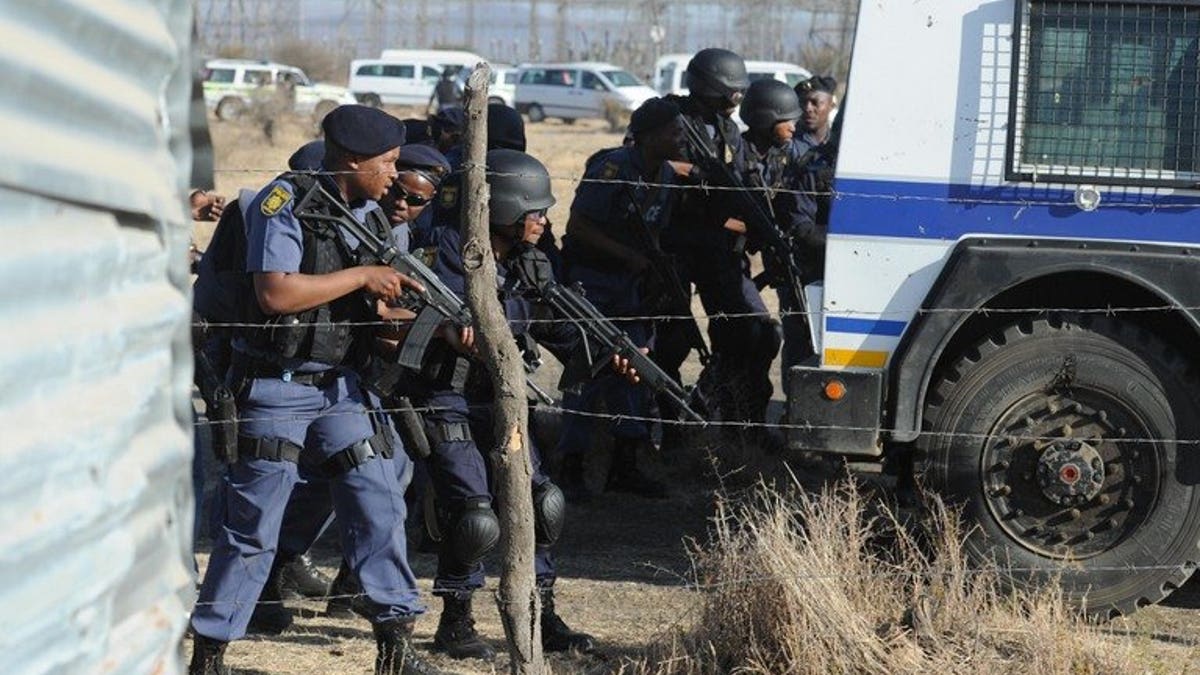
Police officers look at protesting miners near a platinum mine in Marikana on August 16, 2012. South Africa's Marikana commission adjourned Friday with major questions remaining about how police came to shoot dead 34 miners and amid growing concerns about the inquest itself. (AFP/File)
CENTURION, South Africa (AFP) – South Africa's Marikana commission adjourned Friday with major questions remaining about how police came to shoot dead 34 miners and amid growing concerns about the inquest itself.
The government-backed commission retired until July 15, after nine months of deliberations that have been marred by opaque evidence, violence against witnesses and concerns about lengthy proceedings.
The commission is probing the deaths of 34 Lonmin miners and ten others, including two police officers, during a strike in August last year -- the worst post-apartheid violence South Africa has seen.
The Marikana probe, headed by retired judge Ian Farlam, was convened last year by President Jacob Zuma last September.
A string of witness and police officers have appeared before the commission, including national police commissioner Riah Phiyega, with most offering only circumscribed accounts of events.
Only North West Deputy Police Commissioner William Mpembe has taken direct responsibility for police actions.
Mpembe last week said he was responsible for the decision to initiate "phase three" of police operations, to disperse striking Lonmin platinum miners.
That August 16 decision led to police opening fire on miners, images that shocked television viewers around the world and plunged South Africa into crisis.
Mpembe said police, already fearful after the murder of colleagues, did not want to block the protesters in, but "channel" them away from a nearby settlement using barbed wire.
Advocates including George Bizos, Nelson Mandela's long-time lawyer, have contested the police account, saying they did not have plans to protect the settlement and used excessive force against the strikers.
Amid the accusations and counter accusations, continued violence around Marikana, Lonmin and neighbouring mines has enveloped proceedings.
At least six witnesses or upcoming witnesses have died, according to the commission: Three have been murdered, two were found hanged and one died of natural causes.
The violence has been fuelled by a power struggle between the Association of Mineworkers and Construction Union (AMCU) and the National Union of Mineworkers (NUM).
AMCU recently toppled NUM as the biggest union in the platinum industry, sparking tit-for-tat killings between the two factions.
Tshepo Mahlangu, Marikana commission spokesman, said that the inquiry will no longer releasing the names of future witnesses, for fear someone will be intimidated, hurt or killed.
"Tensions were very high among police, AMCU and NUM," said Mahlangu, "you can see tensions are still high."
Concerns are also growing that the commission is taking too long to complete its work, which was originally scheduled to finish within four months.
Aisha Fundi is the 42-year-old widow of Hassan Fundi, a Lonmin security worker who was killed by striking miners. Fundi, wearing a black niqab and a long blue skirt, said she desperately wants the commission to speed up the proceedings.
"We are anxious to get closure," she said, adding that the commission has not yet heard how her husband was killed on August 12.
"We want to know why the killings happened," said Fundi. "It was very, very inhumane the way he died," she said. "Hacking him defenceless in the car, burning him. How can you do that?"
Farlam said the commission has drafted a schedule organising witnesses by the estimated time it will take to hear their testimony: long, medium, short and by affidavit.
"It's designed to shorten the proceedings, so that we're done by the end of October, if not earlier," he said Thursday.
But Mahlangua insisted the commission is necessary to show investors South Africa is abiding by the rules. "It's important to show the world we have a fair process and we will ensure the law."
The South African economy has been hit by the wildcat strikes and labour disputes in the mining sector. Africa's wealthiest economy grew by just 0.9 percent in the first quarter.
Up to 121,500 jobs and 60 percent of the country's platinum output could be at risk amid volatility in the sector, economists at Nomura bank said Tuesday.
The adjournment comes at a time when shareholders are increasingly reluctant to invest in South Africa fearing production delays caused by labour unrest.
"I think it's like a forest fire," said Peter Major, a mining specialist at Cadiz Corporate Solutions, a merger and acquisitions firm in South Africa, about the labour unrest.
"We had a drought of maintenance of law and order, a continuing deterioration in the rule of law," he said.
"Was Marikana a flash point? No it was just a culmination," he said.
